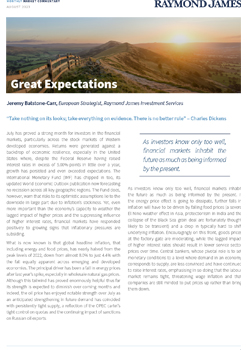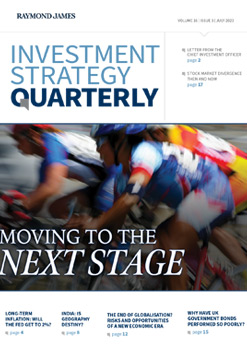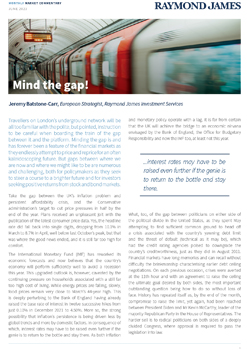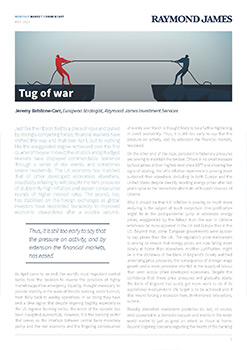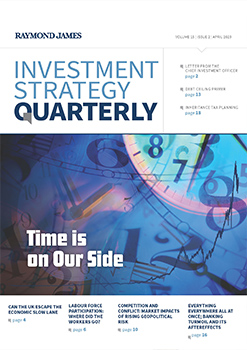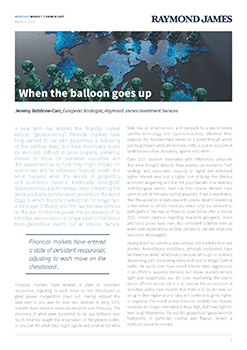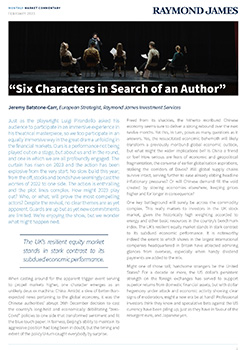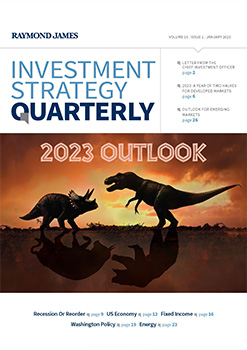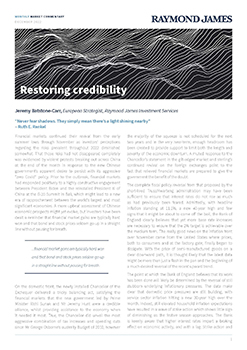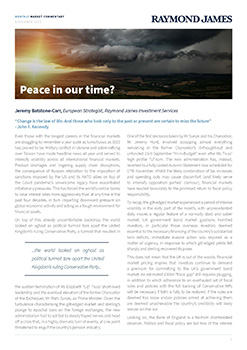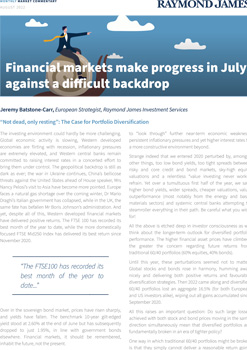In this month’s Market Commentary, Raymond James’ European Strategist, Jeremy Batstone-Carr, discusses the global financial markets, takes a look at the UK and US economies, plus he examines recent challenges in China.
Great Expectations
July has proved a strong month for investors in the financial markets, particularly across the stock markets of Western developed economies. Returns were generated against a backdrop of economic resilience, especially in the United States where, despite the Federal Reserve having raised interest rates in excess of 5.00%-points in little over a year, growth has persisted and even exceeded expectations.
Moving to the Next Stage
This year marks the 110th edition of the Tour de France, the most prestigious bicycle race in the world. And like the markets, the Tour is always challenging—and evolving. The three-week, grueling 2,200+ mile route changes every year and, surprisingly, starts in different countries—this year in Spain versus the UK, the Netherlands, Germany, Belgium, and Denmark over the previous five years! The point is, just like the Tour, economic and market cycles have different starting points, and no two routes are alike.
Mind the gap!
Tug of war
Time is on Our Side
Our latest Investment Strategy Quarterly provides informed insights into a turbulent market with analysis on economic situations at both home and abroad, the questions facing policymakers and investors, plus reasons to be optimistic in the long term. Read all this and more in Investment Strategy Quarterly: Time is on Our Side.
Budget Newsletter March 2023
When the balloon goes up
Six Characters in Search of an Author
2023 Outlook
Our latest Investment Strategy Quarterly discusses the potential opportunities and challenges the new year may bring. With features broadly assessing the outlook for 2023, from an analysis of global developed markets to a search for context and opportunities against the backdrop of an economic slowdown. Read all this and more in Investment Strategy Quarterly: 2023 Outlook.
Restoring credibility
Financial markets continued their revival from the early summer lows through November as investors’ perceptions regarding the risks prevalent throughout 2022 diminished somewhat. That those risks had not disappeared completely was evidenced by violent protests breaking out across China at the end of the month in response to the new Chinese government’s apparent desire to persist with its aggressive “zero Covid” policy.
Budget Newsletter
The line between Statements and Budgets has blurred in recent years. Chancellor Jeremy Hunt’s second major announcement was designated as an Autumn Statement, but it will have a greater financial impact than most Budgets. A broad range of tax increases and spending cuts ensures that will be the case, regardless of the Treasury branding.
Peace in our time?
Even those with the longest careers in the financial markets are struggling to remember a year quite as tumultuous as 2022 has proved to be. Military conflict in Ukraine and sabre-rattling over Taiwan have made headline news all year and served to intensify volatility across all international financial markets.
A time for Finesse
Are you ready for some football? Not American football, but global football—otherwise known as soccer! For the five billion spectators awaiting the start of the 2022 World Cup in Qatar this November, the sport is the epitome of speed and agility. But for the players on the 32 participating teams, it is so much more. The deceptively simple-seeming game requires years of training. It goes beyond the fundamentals of ball control to pitch awareness, anticipation, and making the right decisions under duress quickly.
Growth plan newsletter
What the Chancellor, Kwasi Kwarteng, presented to the House of Commons on Friday was definitively not a Budget; it was ‘The Growth Plan’. The sixth chancellor since 2016 was careful to avoid the B word, despite the huge sums of spending and borrowing that he announced – greater than in most, if not any, real Budgets, let alone mini-Budgets. When the Autumn Budget proper emerges – probably in November or December it is most unlikely to contain anywhere near such a wide range of radical and costly measures as were announced on 23 September.
Financial markets make progress in July against a difficult backdrop
The investing environment could hardly be more challenging. Global economic activity is slowing, Western developed economies are flirting with recession, inflationary pressures are extremely elevated, and Western central banks remain committed to raising interest rates in a concerted effort to bring them under control. The geopolitical backdrop is still as dark as ever; the war in Ukraine continues, China’s bellicose threats against the United States ahead of House speaker, Mrs Nancy Pelosi’s visit to Asia have become more pointed. Europe faces a natural gas shortage over the coming winter, Dr Mario Draghi’s Italian government has collapsed, while in the UK, the same fate has befallen Mr Boris Johnson’s administration.
Deciphering the Market’s Difficult Message
More than 200 years ago, a French military officer stumbled across the Rosetta Stone, a 2000-year-old carving with clues to deciphering the Egyptian hieroglyphs that had puzzled the world for centuries. We don’t exactly have a Rosetta Stone for our perplexing market’s future – no one does. But just as the Rosetta Stone opened a window into Egypt’s mysterious past, we have some clues that might help investors crack the code in the coming months.
Five Months Into The Year
Every year is different from what you expect, and that is particularly true in financial markets. It is easier to say over the first five months of 2022 which investment areas have lost you money, especially if you also factor in the enhanced inflationary backdrop. There will always be some element of volatility in financial market investment, but it still plays the most essential role in any pension fund portfolio or medium-term financial target. What really matters is maintaining confidence during times of uncertainty.
Challenges and Opportunities in May
Whilst the spring weather continues to warm, plenty of financial sector issues continue to worry global investors across both equity and bond markets. Meanwhile heightened inflation levels continued to impact bank account balances, and the war in Ukraine has led to many tragedies along with heightened geopolitical, commodity and supply concerns.


